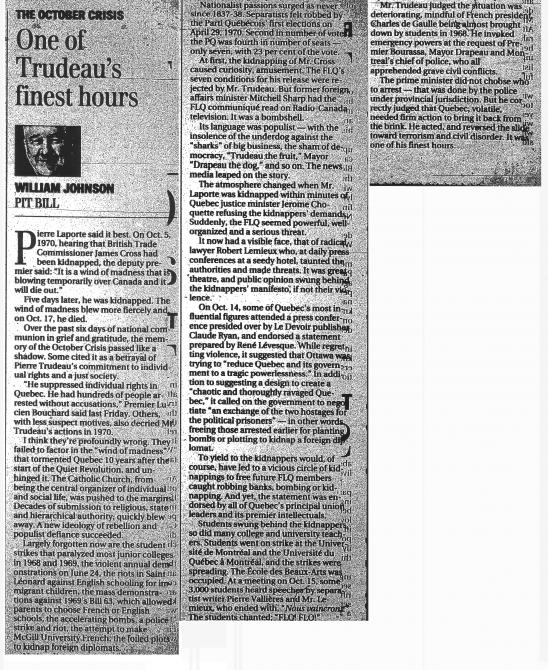 transcription
transcription
Globe and Mail
October 4, 2000
THE OCTOBER CRISIS
One of Trudeau's finest hours
William Johnson
PIT BILL
Pierre Laporte said it best. On October 5, 1970, hearing that British Trade Commissioner James Cross had been kidnapped, the deputy premier said: "It is a wind of madness that is blowing temporarily over Canada and it will die out."
Five days later, he was kidnapped. The wind of madness blew more fiercely and on Oct. 17, he died.
Over the past six days of national communion in grief and gratitude, the memory of the October Crisis passed like a shadow. Some cited it as a betrayal of Pierre Trudeau's commitment to individual rights and a just society.
"He suppressed individual rights in Quebec. He had hundreds of people arrested without accusations," Premier Lucien Bouchard said last Friday. Others, with less suspect motives, also decried Mr. Trudeau's actions in 1970.
I think they're profoundly wrong. They failed to factor in the "wind of madness" that tormented Quebec 10 years after the start of the Quiet Revolution, and unhinged it. The Catholic Church, from being the central organizer of individual and social life, was pushed to the margins. Decades of submission to religious, state and hierarchical authority, quickly blew away. A new ideology of rebellion and populist defiance succeeded.
Largely forgotten now are the student strikes that paralyzed most junior colleges in 1968 and 1969, the violent annual demonstrations on June 24, the riots in Saint Leonard against English schooling for immigrant children, the mass demonstrations against 1969's Bill 63, which allowed parents to choose French or English schools, the accelerating bombs, a police strike and riot, the attempt to make McGill University French, the foiled plots to kidnap foreign diplomats.
Nationalist passions surged as never since 1837-38. Separatists felt robbed by the Parti Quebecois first elections on April 29, 1970. Second in number of votes the PQ was fourth in number of seats – only seven, with 23 per cent of the vote.
At first, the kidnapping of Mr. Cross caused curiosity, amusement. The FLQ's seven conditions for his release were rejected by Mr. Trudeau. But former foreign affairs minister Mitchell Sharp had the FLQ communique read on Radio-Canada television. It was a bombshell.
Its language was populist - with the insolence of the underdog against the "sharks" of big business, the sham of democracy, "Trudeau the fruit", Mayor "Drapeau the dog", and so on. The news media leaped on the story.
The atmosphere changed when Mr. Laporte was kidnapped within minutes of Quebec justice minister Jerome Choquette refusing the kidnappers' demands. Suddenly, the FLQ seemed powerful, well-organized and a serious threat.
It now had a visible face, that of radical lawyer Robert Lemieux who, at daily press conferences at a seedy hotel, taunted the authorities and made threats. It was great theatre, and public opinion swung behind the kidnappers' manifesto, if not their violence.
On Oct. 14, some of Quebec's most influential figures attended a press conference presided over by Le Devoir publisher Claude Ryan, and endorsed a statement prepared by Rene Levesque. While regretting violence, it suggested that Ottawa was trying to "reduce Quebec and its government to a tragic powerlessness." In addition to suggesting a design to create a "chaotic and thoroughly ravaged Quebec," it called on the government to negotiate "an exchange of the two hostages for the political prisoners" – in other words freeing those arrested earlier for planting bombs or plotting to kidnap a foreign diplomat.
To yield to the kidnappers would, of course, have led to a vicious circle of kidnappings to free future FLQ members caught robbing banks, bombing or kidnapping. And yet, the statement was endorsed by all of Quebec's principal union leaders and its premier intellectuals.
Students swung behind the kidnappers, so did many college and university teachers. Students went on strike at the Universite de Montreal and the Universite du Quebec a Montreal, and the strikes were spreading. The Ecole des Beaux-Arts was occupied. At a meeting on Oct. 15, some 3,000 students heard speeches by separatist writer Pierre Vallieres and Mr. Lemieux, who ended with, "Nous vaincrons!" The students chanted, "FLQ! FLQ!"
Mr. Trudeau judged the situation was deteriorating, mindful of French president Charles de Gaulle being almost brought down by students in 1968. He invoked emergency powers at the request of Premier Bourassa, Mayor Drapeau and Montreal's chief of police, who all apprehended grave civil conflicts.
The prime minister did not choose who to arrest – that was done by the police under provincial jurisdiction. But he correctly judged that Quebec, volatile, needed firm action to bring it back from the brink. He acted, and reversed the slide toward terrorism and civil disorder. It was one of his finest hours.